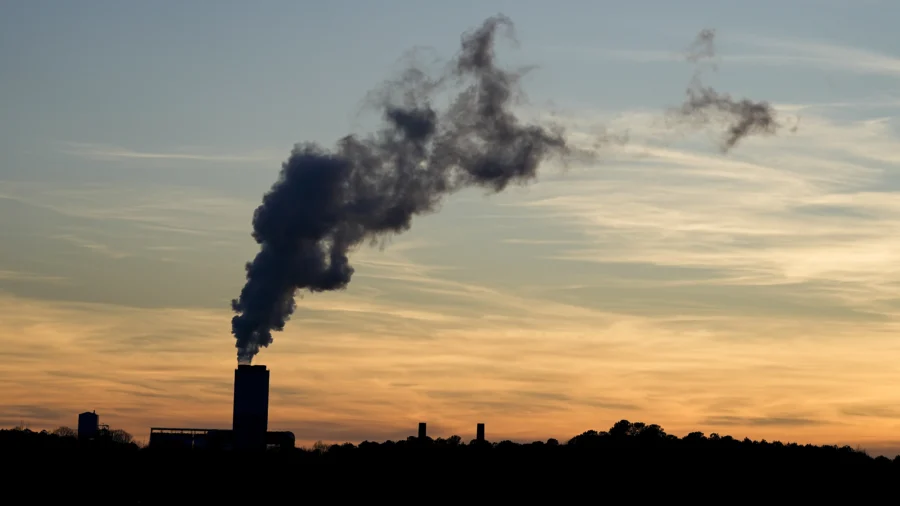A group of 25 Republican state attorneys general is suing to stop new carbon capture regulations the U.S. Environmental Protection Agency (EPA) is seeking to impose on fossil-fuel-fired power plants.
The EPA announced the publication of a final rule on April 25 for new natural gas turbines and existing coal-fired power plants to implement hydrogen co-firing and carbon capture and sequestration/storage (CCS) to lower their output of carbon emissions. The move won praise for President Joe Biden’s administration from environmental groups but prompted alarm from fossil fuel industry allies.
On Thursday, Republican West Virginia Attorney General Patrick Morrisey led a multi-state petition for the U.S. Court of Appeals for the District of Columbia Circuit to review the new EPA rule. The petition calls for the court to declare these new EPA regulations unlawful.
Joining Mr. Morrisey were Republican attorneys general from Alabama, Alaska, Arkansas, Florida, Georgia, Idaho, Indiana, Iowa, Kentucky, Louisiana, Mississippi, Missouri, Montana, Nebraska, New Hampshire, North Dakota, Oklahoma, South Carolina, South Dakota, Tennessee, Texas, Utah, Virginia and Wyoming.
The petition for review does not include specific legal arguments but does signify the interest of these state attorneys general in reversing the EPA rulemaking.
In a press statement announcing the legal filing, Mr. Morrisey noted a previous West Virginia-led effort to challenge an EPA rulemaking, which saw the U.S. Supreme Court rule in the state’s favor in 2022 to limit the executive agency’s rulemaking abilities. The Supreme Court ruled 6-3 in the 2022 case of West Virginia v. EPA that earlier efforts to regulate carbon emissions from existing power plants fall under the “major questions doctrine,” which presumes Congress does not delegate to executive branch agencies regulatory authority over major issues concerning political or economic matters.
“The EPA continues to not fully understand the direction from the Supreme Court—unelected bureaucrats continue their pursuit to legislate rather than rely on elected members of Congress for guidance,” Mr. Morrisey said Thursday.
In his Thursday press statement, Mr. Morrisey argued that the new EPA rule would force coal or natural gas power plants to implement the agency’s carbon reduction measures or face shutdown.
Announcing the new power plant rules last year, EPA Administrator Michael S. Regan denied that the new regulations were aimed at shutting down the coal sector but acknowledged that “we will see some coal retirements” through the new rules.
NTD News reached out to the EPA for comment regarding this new legal challenge but a spokesperson for the agency declined to respond, stating they would not comment on pending litigation.
Biden Environmental Push Riles Opposition
The new EPA efforts to restrain carbon emissions at fossil-fuel-fired power plants are just one of several environmental measures the Biden administration has advanced in recent months.
In January, the Biden administration placed a hold on most new liquified natural gas (LNG) exports. That move has seen pushback from Republican lawmakers and even some congressional Democrats. In March, a group of 16 Republican state attorneys general sued to reverse the LNG export pause.
The EPA revealed another set of regulations in February tightening soot pollution limits. Twenty-six Republican state attorneys general have since filed suit to overturn that rule.
In April, the U.S. Department of Interior raised the fee schedule for companies to lease federal land and other costs associated with fossil fuel extraction on such land.
In April, the Interior Department also moved to block new oil and gas drilling leases and halt most new construction within 13.3 million acres of land in the National Petroleum Reserve Alaska (NPR-A). Alaska Sens. Dan Sullivan and Lisa Murkowski condemned the move. The American Exploration & Production Council (AXPC), a trade association for the oil and natural gas exploration and production industry, said it is also considering its next possible steps to challenge the Interior Department rule.
The Associated Press contributed to this article.

